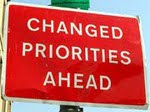“By Jove, it’s the reward circuitry!”
 A dedicated member of the “to each his own taste” club, I’m all for freedom of speech. However, my website happens to discuss the highs and lows of sexual satiety in terms of the highs and lows of the typical addiction cycle. To my surprise (and theirs, I’m sure), men from all over the world showed up in my site’s forum complaining of addiction to porn/masturbation.
A dedicated member of the “to each his own taste” club, I’m all for freedom of speech. However, my website happens to discuss the highs and lows of sexual satiety in terms of the highs and lows of the typical addiction cycle. To my surprise (and theirs, I’m sure), men from all over the world showed up in my site’s forum complaining of addiction to porn/masturbation.
At first it was painful reading their stories. These guys were constantly overheated—due to the many virtual mates that their limbic brains perceived as genetic opportunities. Just a click away, another novel “mate” ached to be serviced—and my visitors’ subconscious, primitive mating program was determined to leave not one unfertilized. In fact, when they tried to stop, they faced weeks of intense, fluctuating withdrawal symptoms:
First guy: The whole day I have been shaking with jitters similar to how it felt when I quit smoking.
Second guy: My withdrawal symptoms? Intense bouts of anger leading to interpersonal difficulties, aggressive demeanor, easily stressed out (I’m inexperienced confronting the world without that soup of post-orgasmic sedation), suicidal ideation, severe depression, violent dreams (I actually enjoyed these, but others might consider them nightmares), insomnia, hallucinations (jumped out of bed screaming because I felt a “presence”), “insects” crawling all over me in bed, shakes, mania (energy far in excess of my ability to use it constructively), and inability to concentrate.
Third guy: Bored? Masturbation. Angry? Masturbation. Sad? Masturbation. Stressed? Masturbation. I went from being the first of my class to the very bottom, until I dropped out for good. I found a Web job, making good money with my porn one click away. This was my life, and I didn’t recognize I had an addiction until I had surgery and masturbation wasn’t an option for fifteen days. On day three, I was literally shaking, and I began to connect the dots. Other symptoms: irritability, inability to focus (“staring at walls syndrome”), mood swings, headaches (sometimes quite strong), sense of pressure in my genitals, flashbacks, paranoia, self-defeating thinking, depression, hopelessness, and fear that I will never have sex because I’ve learned no social skills since diving into porn eight years ago as a teen.
I also heard: “No matter how many orgasms I have, I never feel satisfied; I just finally collapse in exhaustion, and start again the next day.” “To get off, I need extreme material that I never would have viewed before.” “I’m more anxious or depressed, and I have a strong desire to avoid other people.” “When I try to have sex with a partner, I can’t get an erection.”
Many had no religious background, and gradually I realized that debates about guilt, morality, sexual repression, exploitation, and freedom of speech are largely beside the point. Quite simply, these guys had thrown their brain chemistry out of whack. It might have happened to anyone—and probably would have happened to me had I been male. Besides, women have vulnerable limbic brains, too.
The men’s activities were certainly understandable, but changes in their brain’s reward circuitry had nevertheless hijacked their free will. They were hooked.
As Burnham and Phelan explain in Mean Genes: From Sex to Money to Food, Taming Our Primal Instincts, our environment has changed, leaving our primitive, subconscious reward circuitry very vulnerable. It serves our genes before us, so when it perceives “novel mates” around, it can urge us to ignore our well-being…and keep on fertilizing. This is especially true if we aren’t engaging in enough of life’s more soothing rewards: friendly interaction and affectionate touch.
Extreme stimulation of the reward circuitry is risky. The danger isn’t hairy palms or going blind. It’s ending up on a high-speed treadmill, trying to stay ahead of withdrawal symptoms. Normal pleasures—the simple things our brains thrive on—gradually lose their capacity to delight. Biologist Robert Sapolsky remarked:
Unnaturally strong explosions of synthetic experience and sensation and pleasure evoke unnaturally strong degrees of habituation. This has two consequences. As the first, soon we hardly notice anymore the fleeting whispers of pleasure caused by leaves in autumn, or by the lingering glance of the right person, or by the promise of reward that will come after a long, difficult, and worthy task. The other consequence is that, after awhile, we even habituate to those artificial deluges of intensity. . . . Our tragedy is that we just become hungrier. More and faster and stronger.
Even though evolution has molded us rare pair-bonding mammals to find relationships rewarding, their subtler, healthier rewards don’t generate the supranormal stimulation of hours of vivid erotic imagery—especially not as we dull our senses with too much of it. It may be that we need inner equilibrium in order for life’s less intense, but more fulfilling pleasures to register as enjoyable.
These days, equilibrium is tough to maintain. Like it or not, today’s extreme sexual stimulation is like nothing our hunter-gatherer forebears faced in millions of years of brain development. Sure, there was the odd harem, and cave girls were no doubt cute. But their erotically writhing images weren’t airbrushed to perfection, projected on every screen, and relentlessly moaning for sperm donations.
According to Howard Shaffer, Harvard psychologist, “a lot of addiction is the result of experience . . . repetitive, high-emotion, high-frequency experience.” And as long-time Princeton researcher Bart Hoebel said,
Highly potent sexual stimuli [and highly palatable foods] are the only stimuli capable of activating the [brain’s] dopamine system with anywhere near the potency of addictive drugs.
In The Brain That Changes Itself, psychiatrist Norman Doidge points out that,
The addictiveness of Internet pornography is not a metaphor. All addiction involves long-term, sometimes lifelong, neuroplastic change in the brain. … The same surge of dopamine that thrills us also consolidates the neuronal connections responsible for the behaviors that led us to accomplish our goal. (pp. 106-8)
The good news in this tale furnishes further evidence that reward circuitry overload was these guys’ challenge. As I listened sympathetically, feeling helpless, some of them eventually worked out how to return their brains to balance. Slowly, they rebounded.  Things that formerly turned them on, turned them on anew without sexual enhancement drugs. They lost their taste for extreme material. Their anxiety and depression eased. Random feelings of discouragement and remorse evaporated. Humor and optimism bloomed. They started flirting. Their self-esteem improved. In fact, they began to enjoy social interaction generally—even if they withdrew into porn as shy teens.
Things that formerly turned them on, turned them on anew without sexual enhancement drugs. They lost their taste for extreme material. Their anxiety and depression eased. Random feelings of discouragement and remorse evaporated. Humor and optimism bloomed. They started flirting. Their self-esteem improved. In fact, they began to enjoy social interaction generally—even if they withdrew into porn as shy teens.
Their path was not easy, and some are still struggling. (Read about their experiences in The Road to Excess.) Those who escaped seemed to need about a sixty-day moratorium on orgasm and all sexual stimulation to reboot their reward circuitry. Social support really helped, because the brain finds it soothing and rewarding. Said one (who now has a sweetheart):
The withdrawal, as it turns out, was harder than cocaine, opiates, booze, or nicotine. I spent a solid week weeping every night after teaching at the university. I couldn’t sleep, and I had almost zero appetite. The thought of ever dating made me want to curl up into a ball.
But here I am. I feel free.